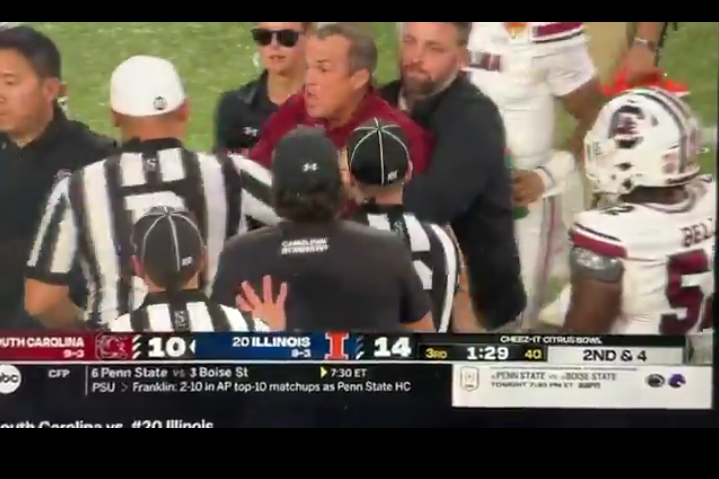In the high-stakes world of college football, emotions often run high, but it’s rare to witness a public confrontation between head coaches. Such an incident occurred during the Cheez-It Citrus Bowl on December 31, 2024, involving South Carolina’s Shane Beamer and Illinois’ Bret Bielema. The altercation provided a glimpse into the intense competitive nature of the sport and highlighted differing perspectives on game conduct and player safety.
The Incident Unfolds
Late in the third quarter, with Illinois leading 14-10, Illinois defensive back Jaheim Clarke sustained an injury while tackling South Carolina quarterback LaNorris Sellers. As medical staff attended to Clarke near the Gamecocks’ sideline, Coach Bielema approached to check on his player. Upon returning to his sideline, Bielema made a gesture resembling the substitution signal used by officials, directing it toward the South Carolina bench. This action did not sit well with Coach Beamer, who perceived it as taunting. Visibly agitated, Beamer advanced toward Bielema and had to be restrained by his staff to prevent a further escalation.
Differing Perspectives
In the aftermath, both coaches provided their accounts of the incident. Coach Beamer expressed his surprise and disappointment, stating, “I’ve got a lot of respect for him; he’s obviously done this for a long time, but in all my years coaching, I’ve never seen that.” Beamer believed that Bielema’s actions were unprofessional and uncalled for, especially during a moment when a player was injured.
Conversely, Coach Bielema offered a different perspective. He explained that his gesture was in response to a kickoff return earlier in the game. According to Bielema, South Carolina signaled for a fair catch—a “T-bar” signal indicating the play would be dead—only to run a trick play instead. While legal, Bielema questioned the ethics of this move, emphasizing that kickoff returns are high-risk plays concerning player safety. He stated, “There’s an unwritten philosophy in coaching when you do [the substitution gesture] as a college kickoff return guy; what we’re doing is you telling everyone else that it is going to be a fair catch, and it’s going to be dead at the end zone. The reason we do that is—kickoff and kickoff returns is the highest percentage of injury in the sport.”
Analyzing the Underlying Issues
This confrontation underscores several critical aspects of college football:
- Player Safety: Both coaches highlighted concerns about player safety, particularly regarding kickoff returns, which are known for their high injury rates. Bielema’s emphasis on the “T-bar” signal reflects a broader coaching consensus to minimize risks during these plays.
- Gamesmanship vs. Sportsmanship: The incident raises questions about the fine line between strategic deception and ethical conduct. While trick plays are part of football’s strategic arsenal, their execution—especially when involving signals associated with player safety—can blur the lines of sportsmanship.
- Communication and Perception: The altercation highlights how actions can be interpreted differently based on perspective. Bielema’s gesture, intended as a commentary on game ethics, was perceived by Beamer as taunting, leading to the heated exchange.
The Aftermath and Reconciliation
Following the game, which concluded with a 21-17 victory for Illinois, both coaches met at midfield for the customary handshake. Observers noted that the exchange appeared cordial, suggesting that any lingering tensions were set aside in the spirit of sportsmanship. In post-game comments, Bielema chose to focus on his team’s performance rather than dwell on the confrontation, stating, “The best is yet to come.”
Broader Implications for College Football
This incident serves as a reminder of the intense emotions inherent in competitive sports and the importance of maintaining professionalism. It also highlights the need for clear communication and mutual respect among coaching peers. As the sport continues to evolve, such episodes can serve as learning opportunities, emphasizing the balance between competitive drive and ethical conduct.
In conclusion, while the altercation between Coaches Beamer and Bielema was a rare public display of discord, it underscores the passion that defines college football. Both coaches, despite their disagreement, demonstrated a commitment to their teams and the game’s integrity, offering a nuanced perspective on the challenges and responsibilities inherent in their roles.
